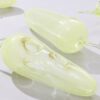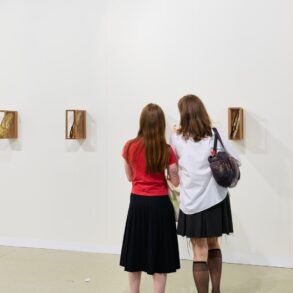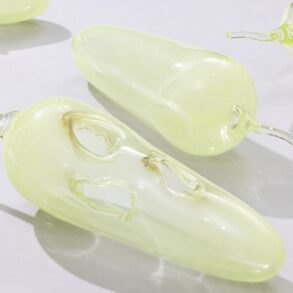Hobart’s Museum of Old and New Art has lodged an appeal with the Supreme Court of Tasmania in its fight to keep its women-only Ladies Lounge open.
Last month, Mona was ordered to close the lounge after a man launched an anti-discrimination case against the museum, as he objected to being refused admission to the space.
Kirsha Kaechele, the artist behind the Ladies Lounge, at the Supreme Court in Hobart. Credit: Jesse Hunniford
The NSW man, Jason Lau, won his case in the Tasmanian Civil and Administrative Tribunal and Mona was given 28 days to stop refusing entry to men. That deadline ended on Tuesday and the Ladies Lounge will be closed until further notice.
But the lounge’s creator, artist Kirsha Kaechele, who is married to Mona founder David Walsh, is not giving up on the lounge’s right to exist and lodged an appeal with the Supreme Court of Tasmania on Tuesday. Her motives go beyond the lounge itself – she wants to challenge the law’s very relationship to and understanding of the arts.
“I think it’s worth exercising the argument, not only for Ladies Lounge, but for the good of art, and the law,” Kaechele said.
“We need to challenge the law to consider a broader reading of its definitions as they apply to art and the impact it has on the world, as well as the right for conceptual art to make some people (men) uncomfortable.
High Tea for Two, Ladies Lounge at Mona, curated by Kirsha KaecheleCredit: Mona/Jesse Hunniford
“Ladies love the lounge – a space away from men – and given what we have been through for the last several millennia, we need it! We deserve both equal rights and reparations, in the form of unequal rights, or chivalry – for at least 300 years.”
Secluded behind green silk curtains, and featuring art by Sidney Nolan and Pablo Picasso, the opulent Ladies Lounge has welcomed about 425,000 visitors since it opened on Boxing Day in 2020.
The hearing at Tasmanian Civil and Administrative Tribunal last month was a highly theatrical event with Kaechele arriving with some 20 supporters, uniformly dressed in officious navy suits, hair pulled back, and donning red lipstick, a la the 1988 Robert Palmer music video Simply Irresistible.
Inside the hearing room, the group performed a silent choreography and read feminist texts – behaviour that the tribunal member overseeing the case, Richard Grueber, later described as bordering on contempt.
Kaechele (left) and supporters arrive for a hearing in March.Credit: Charlotte Vignau
In defending its case at tribunal, Mona’s counsel, Catherine Scott, argued that the Ladies Lounge provided equal opportunity to a group of people – women – who had been historically discriminated against and excluded from many spaces.
Scott relied on the exception provided by Section 26 of the Tasmanian Anti-Discrimination Act 1998, which states: “A person may discriminate against another person in any program, plan or arrangement designed to promote equal opportunity for a group of people who are disadvantaged or have a special need because of a prescribed attribute.”
But the argument did not fly with Grueber, who ruled that while the Ladies Lounge “may have a valid or ethical or pedagogical purpose … it cannot reasonably be intended to promote equal opportunity”.
Mona’s appeal will be lodged on the grounds that the tribunal took too narrow a view of women’s historical and ongoing societal disadvantage and did not recognise how the experience of the Ladies Lounge could promote equal opportunity.
In typically mischievous fashion, Kaechele added: “I am grateful to have received so many wonderful ideas for the future of the Ladies Lounge, and possibilities for its reformation. This encouragement has reassured me that I am indeed appealing.”
A sign saying “closed for reform” now sits at the reception desk of the lounge.
Most Viewed in Culture
This post was originally published on this site be sure to check out more of their content







